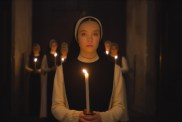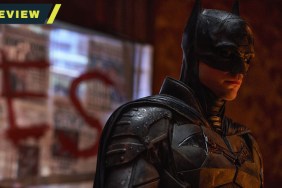
Adapted from the stage musical, which itself was adapted from Victor Hugo’s 1862 French novel, Les Miserables is instantly massive as prisoners heave on giant ropes, pulling a massive ship into the port at Toulon. They sing in tune with each pull, “Look down, look down… Don’t look them in the eye.” It’s here we meet Jean Valjean (Hugh Jackman) for the first time, head shaven and scarred. His sentence of nineteen years for stealing a single loaf of bread has come to an end, but a strict parole has been put in place, limiting his freedom under the watchful eye of the dedicated inspector of police Javert (Russell Crowe).
These opening moments take place in the year 1815 and the film will cover the next 33 years as the people rise up to claim their country, an ex-con will become an adoptive father and a young girl will fall in love. Fans of the stage musical are sure to eat up all 157 minutes of this film, which is every bit a musical as it claims to be. Hardly a word is spoken without being sung and the words are sung quite well as the Tony award-winning Jackman is clearly in his element, Crowe is no stranger to song and Anne Hathaway as Fantine breathes such life into this film, she is sorely missed in the latter two-thirds.
Les Miserables is fantastic for its first 60 minutes, the emotional investment rising with every turn in the story. Eight years following his release, Valjean manages to break parole and reinvent himself. He now owns a factory and lives under the name of Monsieur le Mayor, but his guise will only last him so long, though it will afford him the chance to meet Fantine and soon care for her young daughter Cosette as he must once again run from Javert.
From here the story, again, jumps forward in time. This time nine years have passed, Cosette has grown up and we are introduced to 1832 Paris. Valjean and Cosette (Amanda Seyfried) lead a quiet life while a revolution is brewing in the streets. Javert is still on the hunt and we meet the rebel Marius (Eddie Redmayne) and Eponine (Samantha Barks), the daughter of the innkeepers (Sacha Baron Cohen and Helena Bonham Carter) that cared for Cosette before Valjean relieved them of their duty.
It’s here the film begins to fall apart. Les Miserables reaches such a climax with Hathaway’s show-stopping performance of “I Dreamed a Dream” that simply nothing that comes after it can live up to its excellence. Hathaway, shot in close-up for the song’s duration and without a single cut, is crushing. I can’t remember a time where I was so floored with emotion from one solitary musical performance that the fact her few minutes of song outweigh the entirety of a nearly three hour feature is telling not only of her performance, but of the remaining minutes that follow.
Barks, who played Eponine in the recent London stage adaptation of Les Mis, does provide the film’s second half with a fantastic performance of “On My Own” that stands only second to Hathaway’s “Dream”, but is one of the few remaining highlights as the final 90 minutes drag to an inevitable conclusion.
Beyond Javert’s chasing of Valjean, a storyline that grows quickly tiresome, the second half of Les Mis depends on your believing that in only a glance across a crowded street, Cosette and Marius have fallen madly in love. A performance of “A Heart Full of Love” is then meant to seal the deal. It doesn’t. Eponine’s jealousy and disappointment in Marius’ choice of Cosette over her are the only emotions I was convinced of in these scenes.
I’m not sure if it was due to the fact virtually every word of this film is spoken in song, and if that is a hang-up of my own, but there needed to be a little massaging of the relationship between Marius and Cosette if we were meant to have any emotional investment. As it stands, all that exists is the rebellion (which always seems secondary, even when it’s not), Javert’s tiresome dedication to capturing Valjean and Eponine’s reluctancy to let go of her love for Marius.
The love we’re meant to feel between Cosette and Marius comes across as something director Tom Hooper (The King’s Speech) determined was a given and not something he needed to dedicate any real time to building. If that’s the case, he was wrong. Whether that’s due to the performances of Seyfried (whose singing voice reminds me of a classic animated Disney princess) and Redmayne (whose voice is the most distinguishable among the cast) or the narrative as it was edited together I can’t quite tell, but I will say neither Seyfried nor Redmayne stood out to me as particularly moving, at least not when compared to Hathaway, Jackman, Crowe and Barks.
A bit of humor is injected in the way of Cohen and Carter as the married innkeepers who make their living off thieving and conning the public and both are perfect for their roles (as is their performance of “Master of the House”). It’s also quite clear costume designer Paco Delgado had some of his most fun dressing these two, though I must say the costumes throughout are quite amazing as is the production design led by Eve Stewart whose filmography clearly shows she’s something of a master at these period set pieces, which include Oscar nominations for The King’s Speech and Mike Leigh’s Topsy-Turvy.
Hooper’s handling of such a massive story is a mixed bag of tightly woven storytelling in the first half to dry, dull and tiring in the second. Perhaps that’s just the nature of the story, but everything about the introduction of Marius and all that leads up to the rebellion felt clunky and ill-conceived and none of it believable. Though, I must give kudos to Daniel Huttlestone whose performance as the young street urchin Gavroche provides some moments of enjoyment throughout the film’s latter half through song and general mischief.
I could watch the first hour of this film over again, but once Cosette grows up, Les Mis grows old.









